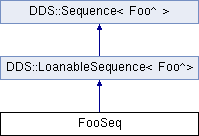<<interface>> <<generic>> A type-safe, ordered collection of elements. The type of these elements is referred to in this documentation as Foo.
More...
#include <managed_sequence.h>

Public Member Functions | |
| FooSeq () | |
| Create a sequence with a maximum of 0. More... | |
| FooSeq (System::Int32 new_max) | |
| Create a sequence with the given maximum. More... | |
| FooSeq (FooSeq^ src) | |
| Create a sequence by copying from an existing sequence. More... | |
 Public Member Functions inherited from DDS::Sequence< Foo^ > Public Member Functions inherited from DDS::Sequence< Foo^ > | |
| System::Boolean | ensure_length (System::Int32 length, System::Int32 max) |
| Set the sequence to the desired length, and resize the sequence if necessary. More... | |
| virtual void | set_at (System::Int32 i, Foo^ val) |
Set the i-th element of the sequence. More... | |
| void | loan (array< Foo^ >^ buffer, System::Int32 new_length) |
| Loan a contiguous buffer to this sequence. More... | |
| void | from_array (array< Foo^ >^ arr) |
| Copy elements from an array of elements, resizing the sequence if necessary. The original contents of the sequence (if any) are replaced. More... | |
| void | to_array (array< Foo^ >^ arr) |
| Copy elements to an array of elements. The original contents of the array (if any) are replaced. More... | |
| System::Boolean | copy_from (Sequence< Foo^ >^ src_seq) |
| Copy elements from another sequence, resizing the sequence if necessary. More... | |
Additional Inherited Members | |
 Properties inherited from DDS::Sequence< Foo^ > Properties inherited from DDS::Sequence< Foo^ > | |
| System::Int32 | length [get, set] |
| The logical length of this sequence. More... | |
| virtual System::Int32 | maximum [get, set] |
| The current maximum number of elements that can be stored in this sequence. More... | |
| array< Foo^ >^ | buffer [get] |
| Return the contiguous buffer of the sequence. More... | |
| System::Boolean | has_ownership [get] |
| Return the value of the owned flag. More... | |
Detailed Description
<<interface>> <<generic>> A type-safe, ordered collection of elements. The type of these elements is referred to in this documentation as Foo.
For users who define data types in OMG IDL, this type corresponds to the IDL express sequence <Foo>.
For any user-data type Foo that an application defines for the purpose of data-distribution with RTI Connext, a FooSeq is generated. We refer to an IDL sequence <Foo> asFooSeq.
The state of a sequence is described by the properties 'maximum', 'length' and 'owned'.
- The 'maximum' represents the size of the underlying buffer; this is the maximum number of elements it can possibly hold. It is returned by the DDS::Sequence::maximum operation.
- The 'length' represents the actual number of elements it currently holds. It is returned by the DDS::Sequence::length operation.
- The 'owned' flag represents whether the sequence owns the underlying buffer. It is returned by the DDS::Sequence::has_ownership operation. If the sequence does not own the underlying buffer, the underlying buffer is loaned from somewhere else. This flag influences the lifecycle of the sequence and what operations are allowed on it. The general guidelines are provided below and more details are described in detail as pre-conditions and post-conditions of each of the sequence's operations:
-
If owned == true, the sequence has ownership on the buffer. It is then responsible for destroying the buffer when the sequence is destroyed.
-
If the owned == false, the sequence does not have ownership on the buffer. This implies that the sequence is loaning the buffer. The sequence cannot be destroyed until the loan is returned.
- A sequence with a zero maximum always has owned == true
-
Constructor & Destructor Documentation
◆ FooSeq() [1/3]
| FooSeq::FooSeq | ( | ) |
Create a sequence with a maximum of 0.
This is a constructor for the sequence. The constructor will allocate no memory.
This constructor will be used when the application creates a sequence using one of the following:
In C#:
In C++/CLI:
- Postcondition
- maximum == 0
- length == 0
- owned == true,
◆ FooSeq() [2/3]
| FooSeq::FooSeq | ( | System::Int32 | new_max | ) |
Create a sequence with the given maximum.
This is a constructor for the sequence. The constructor will automatically allocate memory to hold new_max elements of type Foo.
This constructor will be used when the application creates a sequence using one of the following:
In C#:
In C++/CLI:
- Postcondition
- maximum == new_max
- length == 0
- owned == true,
- Parameters
-
new_max Must be >= 0. Otherwise the sequence will be initialized to a new_max=0.
◆ FooSeq() [3/3]
| FooSeq::FooSeq | ( | FooSeq^ | src | ) |
Create a sequence by copying from an existing sequence.
This is a constructor for the sequence. The constructor will automatically allocate memory to hold foo_seq::maximum() elements of type Foo and will copy the current contents of foo_seq into the new sequence.
This constructor will be used when the application creates a sequence using one of the following:
In C#:
In C++/CLI:
- Postcondition
- this::maximum == foo_seq::maximum
- this::length == foo_seq::length
- this[i] == foo_seq[i] for 0 <= i < foo_seq::length
- this::owned == true
- Note
- If the pre-conditions are not met, the constructor will initialize the new sequence to a maximum of zero.